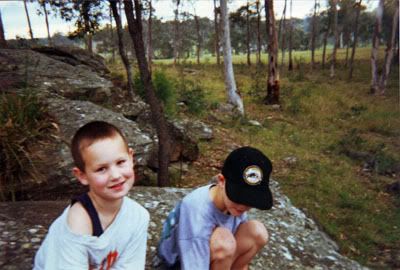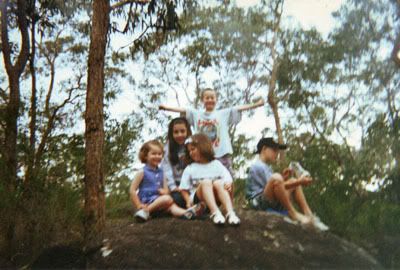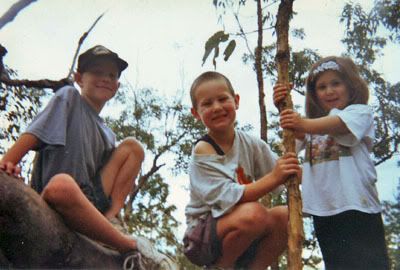My country, your country: Hard hitting thoughts
A few weeks ago, Matt and I went to Canberra to visit our friend Tim. It was early afternoon when we got in, and we were waiting around for Tim to finish work. To fill the time we visited some of the more obscure museums and monuments of Canberra. As the afternoon wound on, we found ourself outside the National Library. We went straight to their bookshop (it was excellent) and while I was there I read a book about making of the ABC TV adaptation of one of my favourite children's books, My Place by Nadia Wheatley.
As I flipped through the pages showing each character's story and the background to the filming, I was struck by photographs of the Aboriginal girl who tells her story in 2008. In the pictures, she was sitting under the big fig tree with her grandmother, listening to stories about the land, their history and their culture.
This, I thought, is a typical Aboriginal scene, of elders passing on stories and meaning to younger generations. But I had another thought, which was this:
I used to sit with my grandmother just like that.
My Grandma and Grandad used to live on a lovely rural property out at Ebeneezer, north-west of Sydney, and as kids we loved going out there to visit. We would go on long walks together, and sometimes just Grandma and I would go on our own. We would visit the big rock pile, or the dam, or the big waterhole. I remember distinctly sitting by the big water hole one day while Grandma taught me how to sign the alphabet (she is deaf, so it is actually a very useful communication tool!). It was such a key moment for me, learning how to be able to spell may way through clunky words so that we could actually converse. It was the moment I felt that I was valuable to my grandmother as a person in my own right, an interesting person to talk to, like the adults.
My grandparents don't live there anymore, but as an extended family, we all hold this ramshackle piece of bush very dear in our hearts. All the special places there had meanings for us - the big water hole, the little water holes, the flat rocks, the good climbing trees. This place holds important memories, especially of my Grandad, who has passed away. I desperately wish I could go back there and see this place again that was such a key prt of my childhood, but someone else owns the property now. I just have to remember the places through photos.
Some of my earliest pictures on my very first camera:
My cousins Daniel and Drew at the small water holes (out of frame)

My cousin Kate, myself, Georgia, Daniel and Drew. My brother took this one.

Drew, Daniel and Georgia

----------------
Back in Canberra, it was 5pm and the library was closing. We still haddn't heard from Tim, so Matt and I wandered back slowly to the distant place where we had parked the car. We walked past the Reconciliation Place monument, a collection of inscriptions - names, quotes, legislation and art work - memorialising the experiences of the stolen generations.
The stories written up along the displays were horrific. Families torn apart, mothers paralysed with grief and removed children abused in every imaginable way. Although there were a few positive stories up there of understanding white people, or of eventual family reunification, most of the stories were sickening pictures of desparation. It was awful to sit and take it all in like that, knowing that this whole chapter of history was so avaoidable!
One quote made me stop in my tracks. It was a woman talking about how she had never really understood who she was because she had never been able to be with her own family in their own place. I wanted to be sick on the spot. Only fifteen minutes beforehand, I had been lost in my own memories of family, and the place that my family felt it belonged to. At what cost were these memories created!? Which Aborignal people were removed from Ebeneezer so that white people could farm? Which indigenous families were torn apart so that I could grow up safely with my own?
Under John Howard, people said that the stolen generation was not this generation's fault. Maybe that is true. I personally can't take any direct responsiblity for destoying countless Aborignal families.
But I was blind to the way that I personally have benefitted from the pain that many many others have suffered. That afternoon at Reconciliation Place, I realised. I am truly sorry.
As I flipped through the pages showing each character's story and the background to the filming, I was struck by photographs of the Aboriginal girl who tells her story in 2008. In the pictures, she was sitting under the big fig tree with her grandmother, listening to stories about the land, their history and their culture.
This, I thought, is a typical Aboriginal scene, of elders passing on stories and meaning to younger generations. But I had another thought, which was this:
I used to sit with my grandmother just like that.
My Grandma and Grandad used to live on a lovely rural property out at Ebeneezer, north-west of Sydney, and as kids we loved going out there to visit. We would go on long walks together, and sometimes just Grandma and I would go on our own. We would visit the big rock pile, or the dam, or the big waterhole. I remember distinctly sitting by the big water hole one day while Grandma taught me how to sign the alphabet (she is deaf, so it is actually a very useful communication tool!). It was such a key moment for me, learning how to be able to spell may way through clunky words so that we could actually converse. It was the moment I felt that I was valuable to my grandmother as a person in my own right, an interesting person to talk to, like the adults.
My grandparents don't live there anymore, but as an extended family, we all hold this ramshackle piece of bush very dear in our hearts. All the special places there had meanings for us - the big water hole, the little water holes, the flat rocks, the good climbing trees. This place holds important memories, especially of my Grandad, who has passed away. I desperately wish I could go back there and see this place again that was such a key prt of my childhood, but someone else owns the property now. I just have to remember the places through photos.
Some of my earliest pictures on my very first camera:
My cousins Daniel and Drew at the small water holes (out of frame)

My cousin Kate, myself, Georgia, Daniel and Drew. My brother took this one.

Drew, Daniel and Georgia

----------------
Back in Canberra, it was 5pm and the library was closing. We still haddn't heard from Tim, so Matt and I wandered back slowly to the distant place where we had parked the car. We walked past the Reconciliation Place monument, a collection of inscriptions - names, quotes, legislation and art work - memorialising the experiences of the stolen generations.
The stories written up along the displays were horrific. Families torn apart, mothers paralysed with grief and removed children abused in every imaginable way. Although there were a few positive stories up there of understanding white people, or of eventual family reunification, most of the stories were sickening pictures of desparation. It was awful to sit and take it all in like that, knowing that this whole chapter of history was so avaoidable!
One quote made me stop in my tracks. It was a woman talking about how she had never really understood who she was because she had never been able to be with her own family in their own place. I wanted to be sick on the spot. Only fifteen minutes beforehand, I had been lost in my own memories of family, and the place that my family felt it belonged to. At what cost were these memories created!? Which Aborignal people were removed from Ebeneezer so that white people could farm? Which indigenous families were torn apart so that I could grow up safely with my own?
Under John Howard, people said that the stolen generation was not this generation's fault. Maybe that is true. I personally can't take any direct responsiblity for destoying countless Aborignal families.
But I was blind to the way that I personally have benefitted from the pain that many many others have suffered. That afternoon at Reconciliation Place, I realised. I am truly sorry.